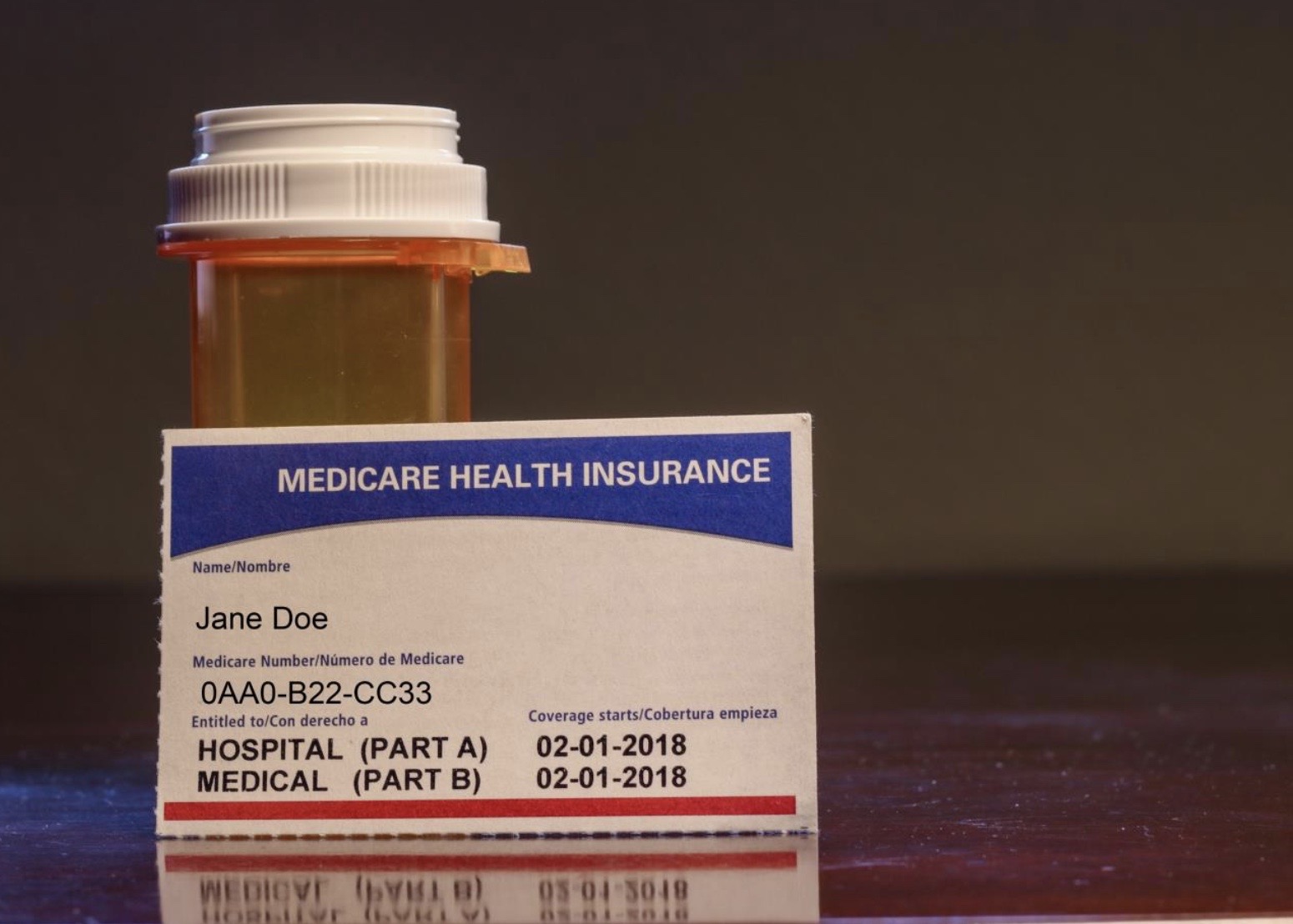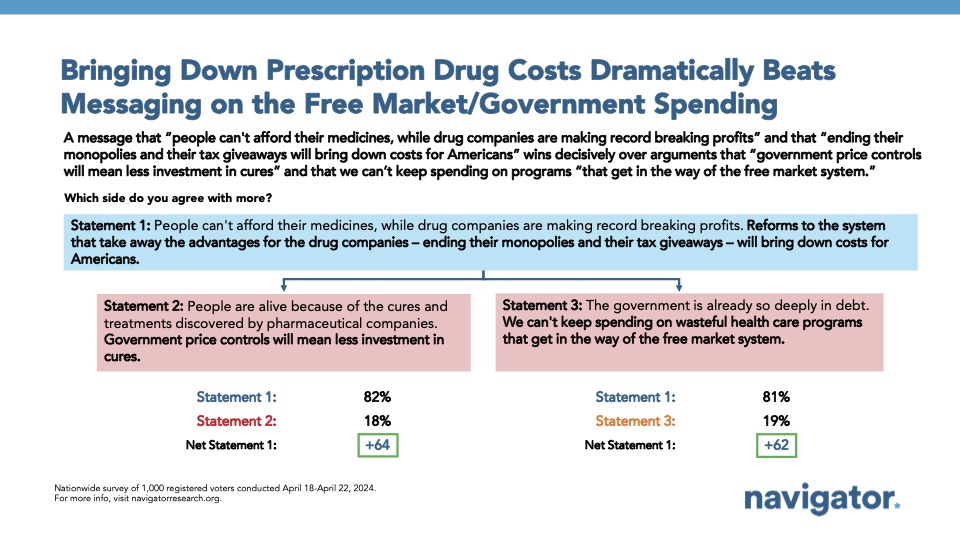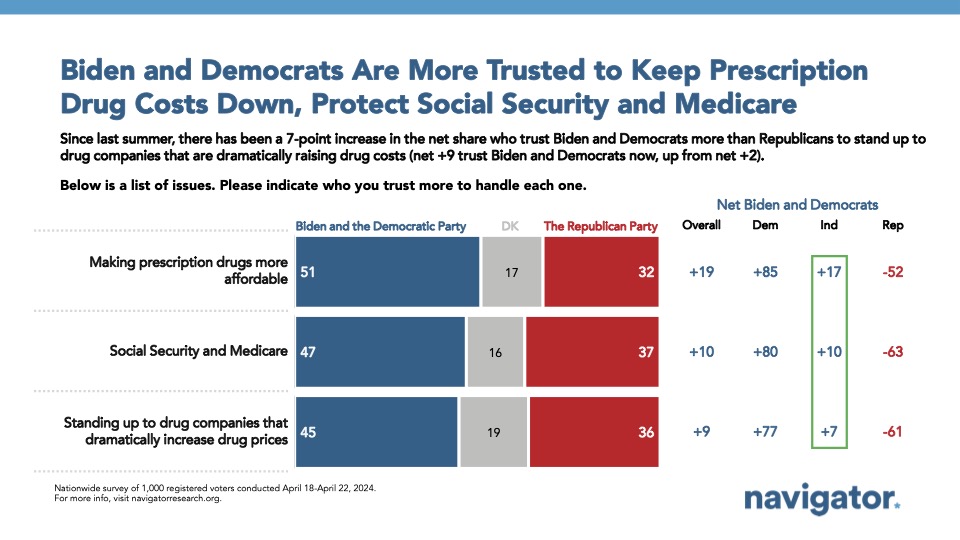Poll: Messaging on Health Care
This Navigator Research report contains polling data on which political party is more trusted to handle a number of issues related to health care, perceptions of health insurance companies and pharmaceutical companies, the top concerns Americans have about what pharmaceutical companies are doing in Washington, and how appealing Americans find members of Congress who support bringing down prescription drug costs.
Health insurance companies and pharmaceutical companies have net negative favorability despite seeing some improvement in recent years.
Health insurance companies have a narrow net -4 negative favorability rating (45 percent favorable – 49 percent unfavorable), while pharmaceutical companies are significantly further underwater at net -25 (34 percent favorable – 59 percent unfavorable). However, both have seen net 14-point upticks in their favorability ratings since October 2019, including health insurance companies improving from net -18 to net -4 and pharmaceutical companies improving from net -39 to net -25.
Americans have deep concerns about pharmaceutical companies, especially around companies raking in record profits while patients can’t afford medicine.
Among a list of criticisms some people have made of what pharmaceutical companies are doing in Washington, the top concern was that “the five biggest U.S. pharmaceutical companies made $80 billion in profits in 2022 alone, while millions of Americans can’t afford the medicine they need” (90 percent found this statement to be concerning, including 71 percent who found it to be “very” concerning). Concern was consistent across partisanship, including 94 percent of Democrats, 89 percent of independents, and 87 percent of Republicans expressing some concern. Other top concerns included that:
- They have spent $400 million on lobbyists to oppose the plan that lowered prescription drug prices (85 percent found this statement concerning, including 62 percent who found it to be “very” concerning);
- They are suing the government to prevent Medicare from negotiating lower drug prices (80 percent found this statement concerning, including 56 percent who found it to be “very” concerning); and,
- They have 1,700 lobbyists, which means 3 lobbyists for every member of Congress (80 percent found this statement concerning, including 52 percent who found it to be “very” concerning).
Strongest health care positioning: bring down prescription drug costs.
The strongest messages on making prescription drugs more affordable focus on stopping price gouging by pharmaceutical companies and lowering costs because Americans are paying more for the same drugs than people in other countries. 70 percent of Americans find it “very” appealing when a member of Congress expresses a desire to “make sure no American has to choose between affording prescription drugs and paying for food and housing,” including more than four in five Democrats (83 percent), two in three independents (67 percent), and nearly three in five Republicans (58 percent). Similarly, 69 percent of Americans find it “very” appealing if their member of Congress supports “lowering the costs of prescription drugs, because Americans pay three to four times more than people do for the same drugs in other countries.”
People agree drug prices should come down, not that the government is spending too much money or stifling innovation and new cures.
In head-to-head statement tests, Americans overwhelmingly agree more with a statement that “people can’t afford their medicines while drug companies are making record-breaking profits… reforms to the system that take away the advantages for the drug companies — ending their monopolies and their tax giveaways — will bring down costs for Americans” over conservative arguments that “government price controls will mean less investment in cures” (the pro-reforms argument wins by 64 points, 82 percent to 18 percent) or that “we can’t keep spending on wasteful health care programs that get in the way of the free market system” (the pro-reforms argument wins by 62 points, 81 percent to 19 percent).
Biden and Democrats are more trusted than Republicans on a range of health care issues.
President Biden and Democrats hold double-digit trust advantages over Republicans to handle making prescription drugs more affordable and to handle Social Security and Medicare. By 19 points, a majority of Americans trust President Biden and Democrats more to make prescription drugs more affordable than Republicans (51 percent Biden/Democrats – 32 percent Republicans), including by 17 points among independents. Biden and Democrats also hold trust advantages over Republicans on handling Social Security and Medicare by 10 points (47 percent Biden/Democrats – 37 percent Republicans), including among independents by 10 points, and to stand up to drug companies that dramatically increase drug prices by 9 points (45 percent Biden/Democrats – 36 percent Republicans), including among independents by 7 points.
About The Study
Global Strategy Group conducted a public opinion survey among a sample of 1,000 registered voters from April 18-April 22, 2024. 100 additional interviews were conducted among Hispanic voters. 75 additional interviews were conducted among Asian American and Pacific Islander voters. 100 additional interviews were conducted among African American voters. 100 additional interviews were conducted among independent voters. The survey was conducted online, recruiting respondents from an opt-in online panel vendor. Respondents were verified against a voter file and special care was taken to ensure the demographic composition of our sample matched that of the national registered voter population across a variety of demographic variables.









